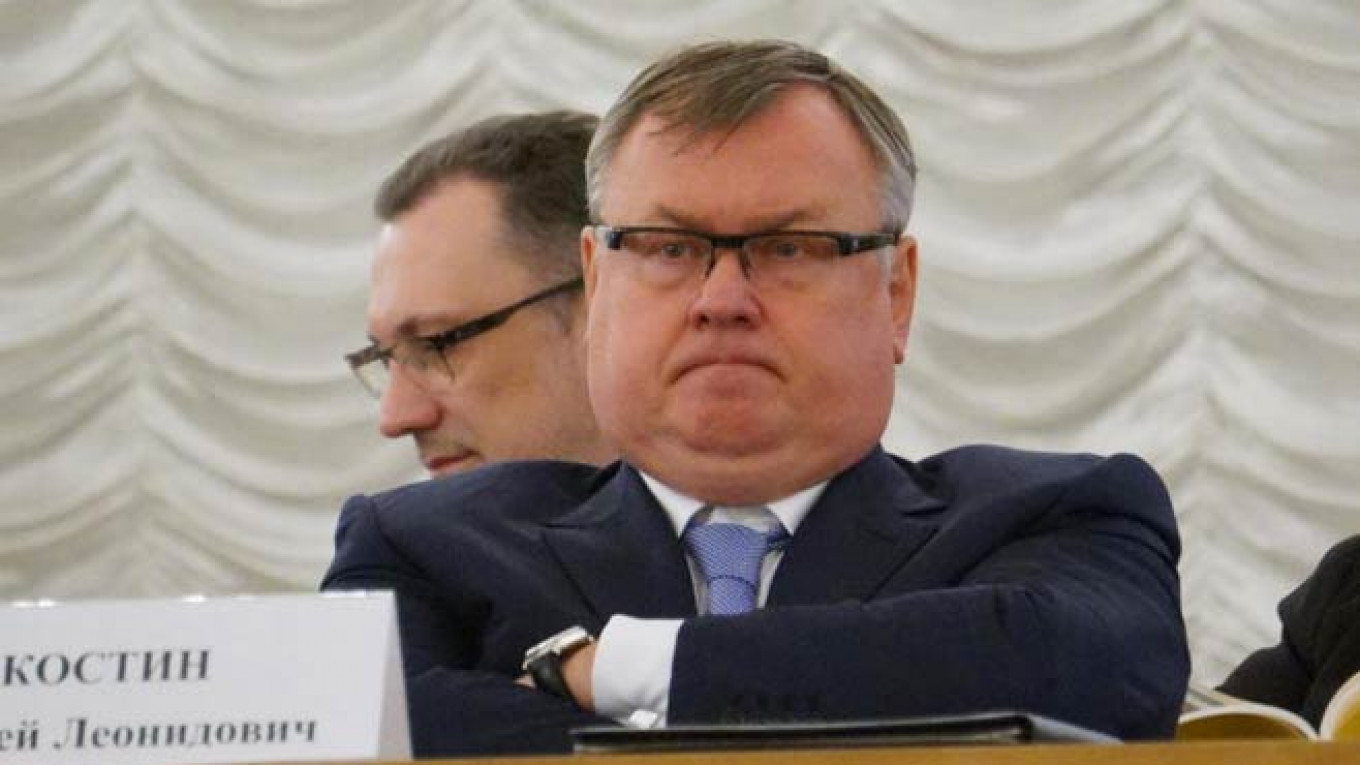VTB, Russia's second-largest bank, aims to boost profits by up to 80 percent to 180 billion rubles ($5 billion) in 2016, but said the turmoil in Ukraine and sanctions over Russia's annexation of Crimea last month had created levels of risk and uncertainty comparable to the 2008-09 financial crisis.
Despite a sharp economic slowdown in Russia, state-owned VTB's core business in the country is strong, the bank's CEO Andrei Kostin said at a presentation of the group's three-year strategy on Thursday. The main risks to VTB come from its exposure to politically unstable Ukraine; in London, where Kostin said the British regulator was putting unwarranted pressure on the bank's subsidiary in the country; and from a possible escalation of sanctions by the West, Kostin said.
Under the strategy, which Kostin said accounted for "all risks that exist now," VTB will boost its assets to 12 trillion to 13 trillion rubles ($336 billion to $364 billion) from 8.8 trillion rubles last year. Net profits will rise to 160 billion under the bank's base scenario, or to 180 billion rubles under the optimistic one, from last year's 101 billion rubles, while return on capital will rise from 12 to 15 percent in 2016.
To achieve this, VTB aims to maintain its strong position in corporate and investment banking, outstrip the market in expanding consumer and small business lending, cut personnel costs by 15 percent and ramp up efficiency.
VTB will also begin integrating its largest banks in preparation for a merger, including VTB24 — Russia's 4th largest by assets as of Jan. 1, according to ratings agency RIA Ratings — and Bank of Moscow — the country's 6th largest.
The mid-sized business portfolio will be spun off into a separate unit to service more than 20,000 clients in 2016, an 80 percent increase.
In 2016, the banking group aims to service 20 million — or one in every five — Russian bank clients, and more than 300,000 small enterprises. To do so, the group will add 1,000 branches to its current 1,600.
VTB aims to achieve this rapid growth as the wider Russian economy has foundered. The Economic Development Ministry this week cut its base growth forecast for the year to 0.5 percent, from 2.5 percent in December. Capital outflow is set to reach $100 billion this year. In the ministry's worst case scenario, the economy will contract by 1.5 percent. In January and February, wages fell by 0.3 percent year-on-year, Vedomosti reported Wednesday.
But the clearest risk to the bank is of losses in crisis-stricken Ukraine, Kostin said. VTB said earlier it has exposure to Ukraine of 20 billion rubles, and that the country accounts for 2 to 3 percent of the bank's total operations, Reuters reported.
Western sanctions, imposed on Russia in response to its annexation of Crimea, also threaten to depress VTB's profits.
The bank is feeling that most clearly in London, where Kostin said he saw political motivations behind an increase in regulatory attention on London-based subsidiary VTB Capital.
Herbert Moos, the bank's chief financial officer, said the regulators had pretensions toward the bank's capital levels and liquidity controls.
"We will sink but we will not surrender!" Kostin joked, before saying he hoped calmer heads would prevail in London and the U.S. and that sanctions would not be beefed up.
"Additional sanctions are the biggest risk to VTB's strategy," he said. "Reason must prevail," he said, adding that "reasonable people work in the U.S."
VTB's Moscow share price dropped sharply at the height of the Crimea crisis. On March 12, two weeks after troops believed to be Russian seized the peninsula, the group's share price plummeted by more than 30 percent. On Thursday VTB was down 22 percent this year. "Undervalued," Kostin called them.
Correction: The original version of this article said that TransCreditBank was among the banks that VTB intends to merge. In fact, TransCreditBank, which VTB bought in 2010, has already been integrated into VTB24.
Contact the author at p.hobson@imedia.ru
A Message from The Moscow Times:
Dear readers,
We are facing unprecedented challenges. Russia's Prosecutor General's Office has designated The Moscow Times as an "undesirable" organization, criminalizing our work and putting our staff at risk of prosecution. This follows our earlier unjust labeling as a "foreign agent."
These actions are direct attempts to silence independent journalism in Russia. The authorities claim our work "discredits the decisions of the Russian leadership." We see things differently: we strive to provide accurate, unbiased reporting on Russia.
We, the journalists of The Moscow Times, refuse to be silenced. But to continue our work, we need your help.
Your support, no matter how small, makes a world of difference. If you can, please support us monthly starting from just $2. It's quick to set up, and every contribution makes a significant impact.
By supporting The Moscow Times, you're defending open, independent journalism in the face of repression. Thank you for standing with us.
Remind me later.






